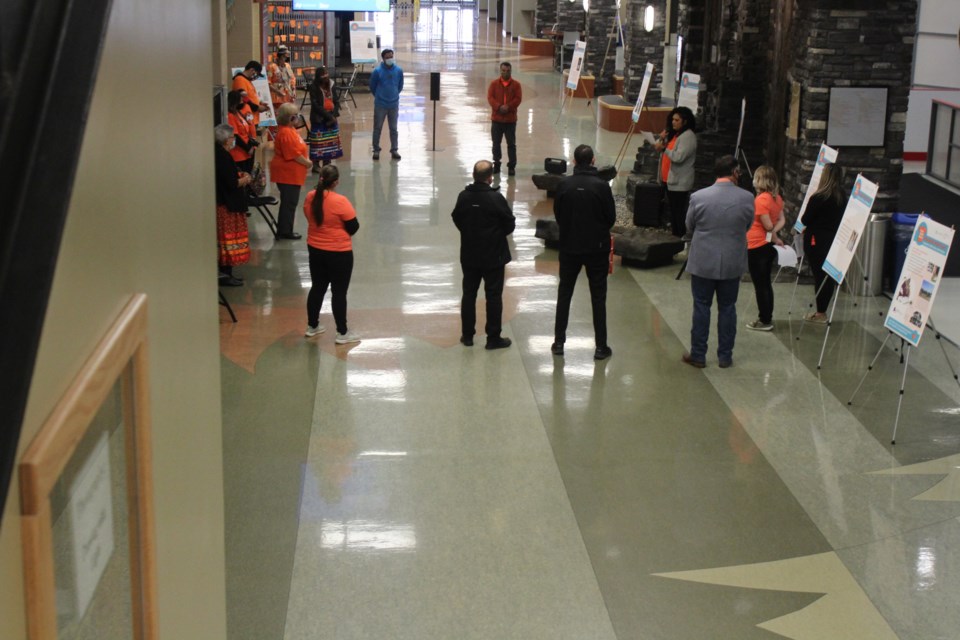Lac La Biche County Mayor Omer Moghrabi told a small gathering of people at an Orange Shirt Day event in the community last week that the region stands behind them.
Hosted by the municipality's Family and Community Support Services as well as the Lac La Biche Canadian Native Friendship Centre, the small gathering at the Bold Center featured an Elder's prayer and presentations by dignitaries and supporters for Indigenous culture and history. Held as an awareness event for the tens of thousands of Indigenous Canadians sent to federally-mandated residential schools, the Orange Shirt Day is seen across the country as a way to continue the celebration of Indigenous culture.
The mayor is proud to live in a community based on that culture.
"We in Lac La Biche County recognize this and we support this and always will," he said.
Using his own Arabic culture as a starting point, Moghrabi said when his family first moved to the Lac La Biche area from Lebanon in the 1950s, it was the Indigenous students who helped his family. While not in a residential school, the mayor said he saw first-hand the challenges, poor treatment and hardships put onto the Indigenous families.
"At that time, we were at school with the Ladouceurs, the Deschambeaus, the Laroques, the Bourques ... and we could never figure out the treatment that these students would have to endure," he said, explaining that as a young immigrant struggling with language barriers, he also felt some of those hardships and discrimination — but not to their degree. "We endured some of that, but not to the scope that the First Nations and Metis people had."
Maintaining culture
The mayor is thankful for his upbringing and the diversity the culture that is based on the first people to live on the lands. He continues to hope that more people learn, grow and continue to appreciate all of the area's cultures. He encouraged Indigenous people to embrace their own cultures — despite existing challenges.
"We do have a long road ahead. Maintain your language, maintain your culture," he said, to Indigenous people at the event, emphasizing the importance of being first people. "People will say, 'Mayor Moghrabi, what about your culture, and your language. I say there's a billion Arabs on the other side of the ocean, they'll maintain it for us pretty good. You are the first nations, you have to maintain it."
Through the reading of several testimonials from Elders and residents across the region, the Orange Shirt Day built on the nation-wide theme of Every Child Matters, referencing those who were in residential schools and those who are now growing up with that history in their background.
"Every child matters because they should not have to experience or suffer from loneliness like previous generations," wrote Kehewin's Lillian Youngchief in a statement read during the event. "Children need their identity, and that is by family bond and not isolation. It is important the children are nurtured and exposed to their cultural ways."
A similar sentiment was written by Marilyn Gladue from Beaver Lake.
"Children matter because they deserve the best from the beginning. Children thrive through nurturing, love and encouragement. Children develop their identity through their environment that may affect their overall health."
Randi-Lynn Nanemahoo-Candline is the child of a residential school survivor. She is also a keynote speaker at cultural events, using her experiences and her traditional jingle dress dances to educate. She admits that the bright colours of her regalia — also known as a healing dress — is a stark contrast to the darkness she felt as a young child.
"Growing up, I knew there was a lot of anger, hurt and sadness, but being a little girl, I didn't know why there was this anger, sadness and hurt. I just didn't know why it was there," she said, explaining that she internalized those feelings and started to believe it was her fault. "I decided it was my fault that my family was hurt and angry. So I grew up feeling quite insecure and insignificant, not thinking I was good enough, and I carried that thought with me for a very long time."
It wasn't until her mother began to find her own healing path from generational residential school trauma that Candline's own feelings changed.
"It helped me to understand that she was only doing the best she could, given the experiences that she had growing up — and her mother the same story," she said, explaining herself as a generational survivor who has grown because her mother fought to reclaim her culture and identity by explaining the pain and trauma.
Too many people took their stories and the opportunity for healing to their graves, said Candline, forcing the next generation to be left with the questions she had as a child. By shining a light on the past and encouraging the healing, she hopes future generations can continue to heal.
"I feel having these kinds of conversations and having these kinds of events ... will break those cycles. We are going to educate not only ourselves, but our children and have empathy for one another and start, to humanize each other."
Many of the testimonials from the Bold Center's Orange Shirt Day event can be found on displays at the Canadian Native Friendship Center. Around the region, the Orange Shirt Day was observed in schools, with students wearing orange-coloured shirts for awareness.
"Having things like this is very important. Vital. It's part of the healing process, acknowledging that this happened and that this history did occur," said Candline.


